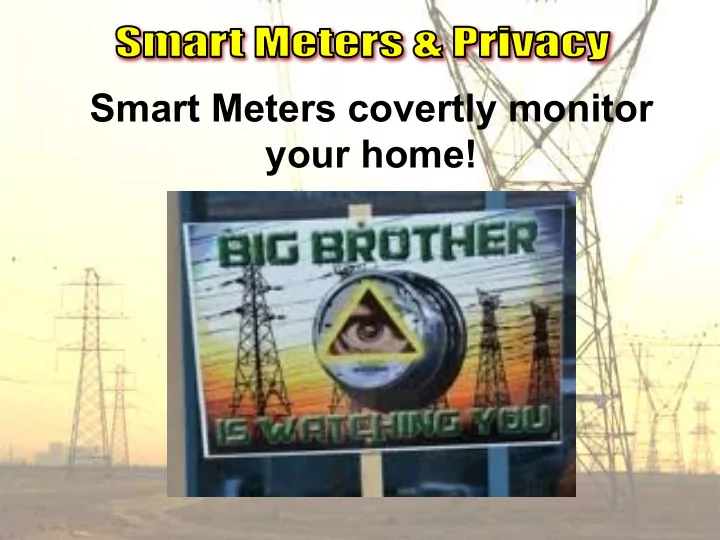

Smart Meters covertly monitor your home!
In 2010, Victoria ’ s Privacy Commissioner expressed concerns about the limitations of Smart Meter privacy by saying: “ … smart meters have the potential to impact severely upon the privacy of individuals who have smart meters installed. These concerns go to the very heart of a right to privacy, given that smart meters collect detailed usage data in an area which is usually “ off limits ” – a person ’ s home. - Helen Versey
She also gave the Essential Services Commission the following warning: “ … Any encroachment into the privacy of a person ’ s domicile should be treated seriously and should only occur when absolutely necessary. Indeed, this principle is espoused in section 13 of the Victorian Charter of Human Rights and Responsibilities, which states that a person has the right not to have his or her privacy, family, home or correspondence unlawfully or arbitrarily interfered with. ” - Helen Versey
Smart Meters violate electricity consumer ’ s Human Rights and other related legislation 1. United Nations Charter of Human Rights 2. The Victorian Charter of Human Rights 3. Victoria’s Information Privacy Act 2000 4. National Principles for the Fair Handling of Personal Information 1999
1. United Nations Charter of Human Rights “ No one shall be subjected to arbitrary or unlawful interference with his privacy, family, home or correspondence, nor to unlawful attacks on his honour and reputation. ” Article 17 - International Covenant on Civil and Political Rights, to which Australia is a signatory
2. Victoria’s Charter of Human Rights The Commissioner for Privacy has already referred to this Charter, as mentioned previously
3. Victoria’s Information Privacy Act 2000 “1.1. An organisation must not collect personal information unless the information is necessary for one or more of its functions or activities.” Ref - Schedule 1 point 1 (Principle 1 – Collection) This law is broken if a power company passes on Personally Identifiable Information to third parties for them to use for other purposes – e.g. market research.
4a. National Principles for the Fair Handling of Personal Information 1999 “1.2 An organisation should only collect personal information by lawful and fair means and not in an unreasonable and intrusive way.” NOTE: To acquire information lawfully, consumers are require to be fully informed about what happens to their personal data and whether they give their approval for its use. This requirement has been overturned with Smart Meter rollout.
4b. National Principles for the Fair Handling of Personal Information 1999 “1.3 ... an organisation should take reasonable steps to ensure that the subject of the information is aware of: ” (a) the identity of the organisation and how to contact it; (b) the fact that he or she is able to gain access to the information; (c) the purposes for which the information is collected;
4c. National Principles for the Fair Handling of Personal Information 1999 “1.3 ... an organisation should take reasonable steps to ensure that the subject of the information is aware of: ” (d) to whom (or the types of individuals or organisations to which) it usually discloses information of this kind; (e) any law that requires the particular information to be collected; and (f) the main consequences (if any) for the individual if all or part of the information is not provided.
4d. National Principles for the Fair Handling of Personal Information 1999 Smart Meters fail to meet these requirements in points (b), (c), d), (e) and (f).
Human Rights to privacy are eroded by smart meters in America The following video explains a number of privacy issues associated with smart meters that currently affect Americans in the same way as they will impact many Victorians in the future. Thank you.
Recommend
More recommend